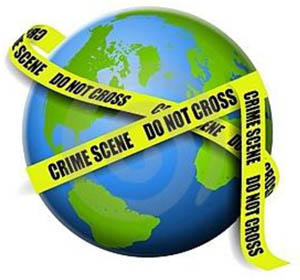
A major report on human health in the Anthropocene, published in the British medical journal The Lancet, begins by noting an apparent paradox, that global human health has been improving even while environmental destruction is undermining it. The explanation, the authors say, is “straightforward and sobering.”
“We have been mortgaging the health of future generations to realize economic and development gains in the present. By unsustainably exploiting nature’s resources, human civilization has flourished but now risks substantial health effects from the degradation of nature’s life support systems in the future.”[1]
This is a critically important insight. Unless radical changes are made soon, the humanitarian gains made in the twentieth century will become terrible costs in the twenty-first.
“Health effects from changes to the environment including climatic change, ocean acidification, land degradation, water scarcity, overexploitation of fisheries, and biodiversity loss pose serious challenges to the global health gains of the past several decades and are likely to become increasingly dominant during the second half of this century and beyond.”[2]
Nowhere is the contradiction between past gains and current decline more evident than in contemporary agriculture. The second half of the 20th century saw extraordinary increases in agricultural production. More grains, vegetables, and meat are produced than ever in history. Although world population has doubled and nearly doubled again in the past 100 years, there is still more than enough food to provide full nutrition for everyone.
But that is only one side of the story. The other side is told by Robert Biel, in Sustainable Food Systems:
“Although it may at the moment be true that there’s enough food ‘around’ (provided we stop wasting it and distribute it fairly), the system which currently produces that food is not ecologically sustainable into the future. It’s not just that this system is failing but, more fundamentally, it is actually its successes which are eroding our future.”[3]
Karl Marx, following the agricultural chemist Justus von Liebig, called capitalist agriculture a robbery system, because it maintains current production by undermining the metabolic processes required for future production.
In Marx’s words: “All progress in capitalist agriculture is a progress in the art, not only of robbing the worker, but of robbing the soil; all progress in increasing the fertility of the soil for a given time is progress towards ruining the more long-lasting sources of that fertility”[4]
Capitalist agriculture steals from the future, and our children will suffer the consequences. As I’ve written before, it must be replaced by a society of good ancestors, one that consistently works for a better future. A system that thinks and acts to protect the interests of our grandchildren — and their grandchildren.
That’s the society that ecosocialism aims to build.
Notes
[1] “Safeguarding Human Health in the Anthropocene Epoch,” The Lancet 386, no. 10007 (July 16, 2015). Ironically, the study was funded by the Rockefeller Foundation, an institution whose wealth came from the industry that has done more to destroy our future than any other.
[2] Ibid
[3] Robert Biel, Sustainable Food Systems: The Role of the City (London: UCL Press, 2016), 6.
[4] Karl Marx, Capital, Volume 1 (London: Penguin, 1976 [1867]), 638



The root of the problem lies in the conventional money system [CMS], because the CMS is not designed to allow money to show it’s moral colour.
Conventional money is a record of value that is all. It contains no information about where, or from what, the value was derived. In this digital age this information could be linked to each unit of currency so that the intended recipient of a payment could check whether they approved of the money’s previous holders or not and refuse to accept it if they did not approve of them.
Basically the Money System should be designed to keep a digital history of a unit of currency’s holder’s identities which list should be publicly available for inspection by anybody.
The users of currency would then be able to apply their personal value systems in its use.
“…an entire society, a nation, or all simultaneously existing societies taken together, are not owners of the earth. They are simply its possessors, its beneficiaries, and have to bequeath it in an improved state to succeeding generations as ‘boni patres familias’ [good heads of the household].” Karl Marx
Capitalist industrial agriculture robs the soil of its nutrients and pollutes the air and waterways. The dead zones in lakes and at the mouths of rivers are the result of excess nitrogen fertilizer, a process which is only a little over a century old. This manner of agriculture is more akin to mining than traditional farming.
People who practice sustainable agriculture in the so-called third world, or “undeveloped” world, are being displaced by plantation-style production of single crops for the export market. Profit is the prime mover and people and their nutritional needs are ignored. Those displaced either take tenuous seasonal agricultural labor or migrate to the slums of large cities to become part of the reserve army of labor, at best.
The current article, on this site, about Cuban urban agriculture is one method to overcome problems caused by industrial agriculture.
Many thanks for this.